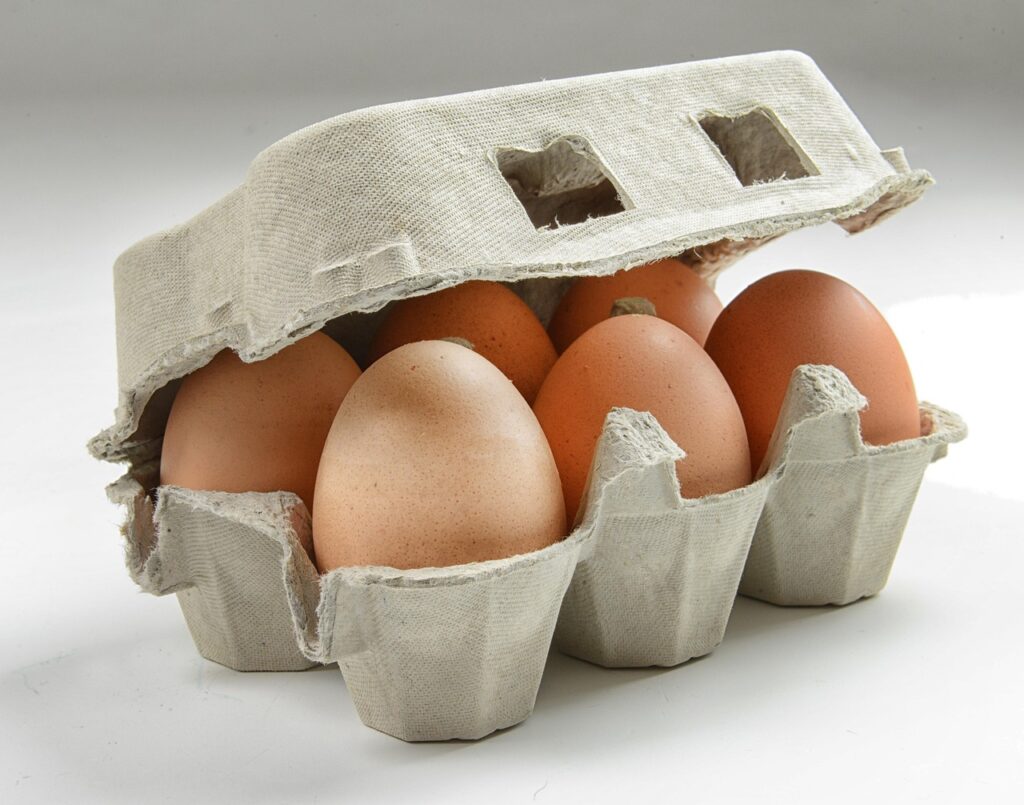Why Unwashed Eggs Last Longer Than You Think
In the world of backyard chicken keeping and farm-fresh food, one question often cracks open debates: how long do unwashed eggs last on the counter? The answer surprises many—especially those used to refrigerating store-bought eggs.
Unlike the sanitized, refrigerated eggs found in grocery stores across the U.S., unwashed eggs retain a natural protective layer called the “bloom” or “cuticle.” This invisible shield helps block out bacteria and moisture, making room-temperature storage a safe and viable option—especially in countries where refrigeration isn’t the norm.
In this article, we’ll dive deep into the science, safety, and smart practices behind storing unwashed eggs on the counter. Whether you’re a homesteader, farmer’s market regular, or backyard chicken enthusiast, this guide has everything you need to keep your eggs fresher, longer—without the fridge.

Image by Ted Erski from Pixabay
What’s the Deal with Bloom?
Freshly laid eggs come coated in a thin, natural membrane known as the bloom. It’s the egg’s first line of defense, sealing pores in the shell and locking out harmful microbes like salmonella. When left intact, the bloom significantly extends an egg’s shelf life—even outside the fridge.
Here’s why the bloom matters:
- Antibacterial Barrier: Prevents harmful bacteria from penetrating the shell
- Moisture Retention: Maintains internal freshness by limiting evaporation
- Preservation Power: Naturally boosts shelf life without refrigeration
Once washed, this protective layer is stripped away—opening the door to faster spoilage.
Pro Tip: If you raise chickens, avoid washing eggs until you’re ready to use them. That bloom is nature’s vacuum seal.
Washed vs. Unwashed Eggs: The Core Differences
| Feature | Washed Eggs | Unwashed Eggs |
| Protective Bloom | Removed | Retained |
| Shelf Life on Counter | 1–2 days | Up to 21 days |
| Refrigeration Required | Yes | Not immediately |
| Common in | U.S. supermarkets | Europe, homesteads |
| Risk of Bacterial Entry | Higher | Lower (with intact bloom) |
In the U.S., egg washing is mandated by the USDA, whereas Europe typically forbids it. This distinction explains why European markets sell eggs unrefrigerated and safely store them on shelves.
How the U.S. vs. Europe Stores Eggs
Egg storage practices vary wildly by region. In the United States, eggs are sanitized, processed, and refrigerated to mitigate salmonella risks. In Europe, regulations focus more on preventing contamination at the farm level rather than post-processing.
Here’s how the approaches differ:
- U.S. Approach:
- Washes eggs to remove visible dirt
- Requires refrigeration for safety
- Shorter shelf life once out of fridge
- Washes eggs to remove visible dirt
- European/Global Approach:
- Prohibits washing
- Focuses on farm cleanliness
- Allows room-temp storage for 2–3 weeks
- Prohibits washing
How Long Do Unwashed Eggs Last on the Counter?
Unwashed eggs can typically last 2 to 3 weeks on the counter—up to 21 days, depending on conditions. The keyword here is unwashed. Once washed, the shelf life drops dramatically unless the eggs are immediately refrigerated.
Influencing Factors:
- Ambient temperature: Ideal storage is below 75°F (24°C)
- Humidity levels: High humidity can promote bacterial growth
- Egg freshness: The sooner laid, the longer they’ll last
- Airflow: Well-ventilated spaces discourage mold or spoilage
Temperature’s Role in Egg Freshness
Room temperature storage works best in cool, stable environments. In hot or fluctuating climates, the egg’s interior begins to degrade faster, leading to:
- Increased bacterial activity
- Loss of viscosity (runny whites)
- Eggs absorbing odors or moisture
Ideal temperature range:
50°F–70°F (10°C–21°C)
Eggs stored above 80°F (26°C) for extended periods are at much greater risk of spoilage, even with the bloom intact.
What Makes Eggs Go Bad Faster?
Several common mistakes can shorten the shelf life of unwashed eggs:
- High heat or sunlight exposure
- Overhandling or micro-cracking
- Storing near fruits like apples or bananas (which release ethylene gas)
- Not rotating stock (using oldest eggs first)

Best Practices for Storing Eggs on the Counter
Here’s how to store unwashed eggs safely outside the fridge:
- Use a breathable container like a ceramic bowl or egg skelter
- Keep out of direct sunlight
- Ensure airflow by not overcrowding
- Label eggs with the lay date
- Rotate stock—use oldest first
Optional Add-On: Apply a light coat of food-safe mineral oil to reinforce the bloom and extend shelf life.
Should You Refrigerate After Leaving Out Eggs?
Once unwashed eggs have been stored at room temp for a while, you can refrigerate them later, but avoid switching back and forth. The key issue is condensation, which can draw bacteria into the shell.
Rule of Thumb:
- Store unwashed eggs at one consistent temperature.
- If you decide to refrigerate after a few days on the counter, don’t return them to the counter again.
How to Rotate Counter-Stored Eggs
Using the First In, First Out (FIFO) method is crucial.
Rotation Tips:
- Use a marked egg skelter or basket with dates
- Move older eggs to the front weekly
- Crack questionable eggs into a separate dish before cooking
How to Tell If an Egg Has Gone Bad
Spoiled eggs often show signs before they ever make it to the frying pan. Here’s what to look out for:
- Smell: A sulfur or rotten odor is a dead giveaway
- Sound: Sloshy eggs may indicate liquefied insides
- Shell: Cracks or sticky residue can signal contamination
Float Test: Myth or Must?
The float test is a handy, quick way to assess freshness.
How it works:
- Fill a bowl with water.
- Gently place the egg inside.
| Result | Meaning |
| Sinks and lays flat | Very fresh |
| Tilts upright | 1–2 weeks old |
| Floats | Old or bad—discard it |
While not 100% foolproof, the float test is useful when you’re unsure of age or storage history.
Are Unwashed Eggs Safe to Eat After 2 Weeks?
Yes—if stored properly, unwashed eggs are safe to eat after two weeks on the counter. However, always perform the float test or crack test to confirm freshness before consuming.
Does Nutritional Value Decline Over Time?
Eggs lose a bit of nutrition as they age, but nothing drastic in the first few weeks. Vitamin A and omega-3 levels may decrease slightly, but protein and fat content remain stable.

How to Handle Farm-Fresh Eggs Safely
To keep things safe and sanitary:
- Wash just before use (not before storage)
- Store in clean, dry containers
- Discard any eggs with visible cracks
- Avoid leaving eggs near strong-smelling foods (they absorb odors)
For Backyard Chicken Keepers
If you’re collecting eggs daily:
- Use dated baskets or trays
- Store in a cool pantry or cellar
- Check for cracks and dirt—clean gently without removing bloom
For Farmers Market Buyers
Ask the seller:
- Are the eggs washed or unwashed?
- When were they laid?
- How have they been stored?
If the eggs are unwashed and freshly laid, they’re fine for the counter—just use within 2–3 weeks.
For Homesteaders Practicing Off-Grid Living
Unwashed eggs are ideal for off-grid kitchens. Without refrigeration, store them in:
- Clay pots (for evaporative cooling)
- Dark pantries or root cellars
- Covered wire baskets with airflow
Freshness Timeline Based on Storage Method
| Storage Method | Shelf Life |
| Unwashed on counter (cool) | 2–3 weeks |
| Washed, refrigerated | 4–5 weeks |
| Unwashed, refrigerated | 3 months or more |
| Washed on counter | 1–2 days (not recommended) |
Frequently Asked Questions
1. How long can I keep unwashed eggs without refrigeration?
Up to 21 days, if stored in a cool, dry place out of sunlight.
2. Can I wash dirty eggs and still leave them on the counter?
No. Washing removes the protective bloom—refrigerate immediately after washing.
3. Do I need to turn eggs like cheese or wine?
Not necessary, but gentle rotation can help if you’re storing for extended periods.
4. Are fertilized eggs safe to eat after storage?
Yes—fertilized eggs are just as safe if stored properly and not incubated.
5. Can I store eggs in cardboard cartons on the counter?
Yes, as long as the cartons are clean and the area is cool and dry.
6. What temperature is too hot for counter storage?
Anything above 80°F (26°C) accelerates spoilage—refrigerate in hot climates.

Image by congerdesign from Pixabay
Conclusion: Keeping It Fresh
So, how long do unwashed eggs last on the counter? Up to three weeks, safely and naturally. Thanks to the protective bloom, unwashed eggs offer a shelf-stable alternative for those looking to embrace a more natural, farm-fresh lifestyle.
Whether you’re collecting from your own coop or buying from local vendors, understanding the science behind unwashed egg storage helps you preserve freshness, reduce waste, and enjoy eggs the way nature intended—simple and safe.
